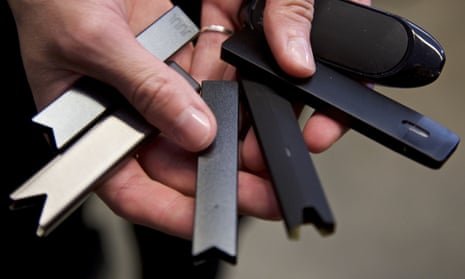Vapers in Australia will require a prescription for liquid nicotine but Greg Hunt has quietly abandoned a plan to ban the importation of vaping devices after a Coalition revolt.
On Monday, the Therapeutic Goods Administration gave its final decision requiring a prescription from 1 October, warning that e-cigarettes’ benefit as a quit aid must be weighed against harm to adolescents who may take up smoking.
In response, the health minister announced that proposed import restrictions that he was forced to delay in June “will not be proceeding due to the significant overlap with the TGA decision”.
The regulation proposed to ban both liquid nicotine and personal nicotine vaporisers, and tobacco industry sources believe that removing the import restriction will practically water down enforcement. The health department insists a process for Border Force to query the lawfulness of an import without a prescription is in place.
The Liberal senator, Hollie Hughes, said 28 Coalitions MPs and senators had signed a letter opposing the import restriction, and Hunt had now abandoned it.
“After the TGA and Hunt announcements, it’s clear they’ve listened, reversed position on the regulation, and that’s no longer on the table,” she told Guardian Australia. “We welcome that move.”
“We’ve gone from an attempt to restrict vaping to what is fundamentally the status quo [on personal importation] with a step to legalisation through a national prescription scheme.”
There are already bans in every state and territory except South Australia on personal possession or use of nicotine e-cigarettes and liquid nicotine without a prescription but the laws are little enforced.
In a statement, the TGA warned that “individuals attempting to import commercial quantities of nicotine e-cigarettes and liquid nicotine may be subject to importation and seizure of products and potential fines under existing regulation”.
The TGA’s public consultation received more than 2,000 public submissions, many from vapers concerned that requiring a prescription would reduce uptake of an option that minimises harm in comparison with combustible cigarettes.
The TGA delegate who approved the ban acknowledged “the personal experiences” shared in the consultation including “the successful use of nicotine e-cigarettes as an aid to quit smoking for these individuals”.
“However, while some individual smokers have successfully used nicotine e-cigarettes to quit smoking, evidence at a population level is lacking.”
The delegate expressed concern that adolescents are “vulnerable and particularly susceptible to nicotine addiction”, citing Irish Health Research Board reports that e-cigarette use makes them three to five times more at risk of smoking combustible cigarettes than those who have never used e-cigarettes.
The TGA decision also requires child-resistant closures for liquid nicotine to reduce the risk to children of accidental ingestion.
Hunt welcomed the TGA decision, which he noted was “independent of government” and “legally binding”.
He announced the government would allow Medicare refunds for doctors to use telehealth to prescribe vaping as a smoking cessation aid, to be available six months before the 1 October start date.
The government will also provide $1m for an education campaign focused on smoking cessation.
Internal critics of Hunt’s proposal, including Hughes and the National senator Matt Canavan, have warned that a prescription-only model is impractical, with just 14 of the 30,000 eligible GPs now prescribing e-cigarettes.
The pair’s open revolt has won favour in the Coalition party room, where 10 MPs and senators raised concern about the prescription-only model including the Liberals Trent Zimmerman, Tim Wilson and Eric Abetz and the Nationals Perrin Davey, Barnaby Joyce and George Christensen.
Earlier in December a Senate inquiry recommended that the government stay the course on the prescription-only model.
The Liberal senator Sarah Henderson combined with Labor and Centre Alliance to reiterate that e-cigarettes should be treated as a therapeutic good, rather than a consumer good sold over-the-counter.
Despite backing the prescription model as the “best pathway” to treat smokers, Henderson suggested in additional comments that the TGA “should consider reviewing the classification of liquid nicotine to enable it to be sold in pharmacies without a prescription” in future.
